Bloodhound diary: Looking towards a supersonic New Year
- Published
A British team is developing a car that will capable of reaching 1,000mph (1,610km/h).
Powered by a rocket bolted to a Eurofighter-Typhoon jet engine, the Bloodhound SSC (SuperSonic Car), external vehicle will mount an assault on the land speed record.
Wing Commander Green is writing a diary for the BBC News Website about his experiences working on the Bloodhound SSC (SuperSonic Car) project and the team's efforts to inspire national interest in science and engineering.
Fresh back from supporting Royal Air Force operations over Libya, a holiday seemed like a good idea.
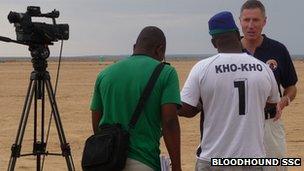
SABC TV joins the interview queue
What I did, of course, was something completely different - a two-week lecture tour of South Africa, which was anything but a rest.
The main aim was to deliver the prestigious John Orr Lecture at the invitation of the South African Institution of Mechanical Engineers and, being Bloodhound, we inevitably got carried away and did some other stuff as well.
The result was a total of 24 engagements in the first 10 days, including some amazing responses from the media.
It's the first time I've been on a national radio chat show and had national breakfast TV phone in to ask for an interview!
We are still 18 months from running Bloodhound in South Africa and already the interest is huge.
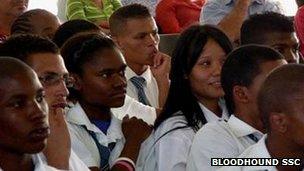
Rapt attention at Floors Comprehensive School, Kimberley
The tour was all about promoting the Bloodhound Education Programme, which received terrific support right across South Africa.
We had record audiences, ranging from 200 to 500 strong, and every venue was full to overflowing. Add a handful of school visits to the programme and I spoke to well over 2,000 people during the tour.
The slightly scary thing is that every one of them is promising to come and see the car run in 2013 - it's going to be busy on the desert when they all arrive together!
The John Orr lectures were a great opportunity to promote our education programme to a new audience.
We are now approaching 5,000 schools signed up to the programme, mostly in the UK, and the numbers are still growing.
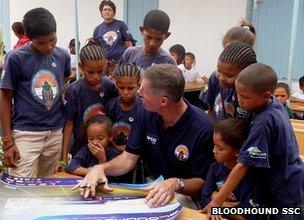
What is the Afrikaans word for "supersonic"?
Dave Rowley, our education director who made all this happen, has now moved out to South Africa to work his magic out there. If your school isn't already signed up to this free scheme (come on, it's free - why wouldn't you?) then do it now, external.
We are also recruiting Bloodhound ambassadors both in the UK and in South Africa, so if you fancy helping to inspire the next generation with the magic of science and engineering, have a look at the Bloodhound Ambassador Programme, external.
The opening line of a recent letter from a student, external describes our "engineering adventure" perfectly: "When one of my science teachers told me about the Bloodhound project, I was immediately hooked." That's what it's all about.
The most memorable school visit was at a small township called Groot Mier, right next to Hakskeen Pan where we will be running the car in 2013. It was also the most challenging, as they really didn't speak English!
What is the Afrikaans word for "supersonic"?
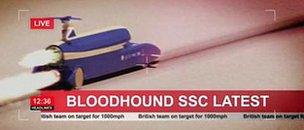
Intel's Bloodhound video is becoming a YouTube classic
Fortunately, our local Bloodhound "track boss", Rudi Riek, was on hand to translate for me.
This was a huge event for the local school, and the whole township, as the Northern Cape Premier flew in for the day with her team to visit the school and to find out how the track preparation was going.
The kids were all spellbound by the animations and videos, particularly the Intel video of Bloodhound, external on their own desert.
Of the 50 kids at the school, 39 of them had family members working on the Pan - part of a team of 317 people from the local communities who are working to create the perfect track for Bloodhound.
This is a poor area of South Africa and the track work is already bringing money into the local community - and a lot more will follow when thousands of people come to visit in 2013.
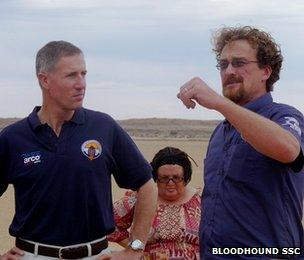
Track Boss Rudi Riek explains the desert preparation to the Northern Cape Premier and her team
Bloodhound is going to make a huge difference to these people, which is great.
The desert preparation work is going very well. The Northern Cape team is just finishing the main track - at 20km by 500m wide, that's 10 million square metres cleared so far.
The key technical challenge has been removing the soil causeway that cuts across the Pan and making it flat again. I'm going to have to drive across this area at over 700mph, so it needs to be perfect.
They have completed the precision grading work and now we're waiting with bated breath for the rains (due any time now) to seal the surface and finish the job.
This will leave Hakskeen as the world's best race track - and it's great to see that the Northern Cape is just as excited as we are about it. You'll be able to see more of our South African adventure on our web TV channel early next year.

The Causeway: Left image shows what it looked like before all the work. Right image as it is now
Whilst I was rushing around South Africa, the engineering team was busy back in the UK, and I got back just in time to witness an historic moment.
After five years of effort to find the ideal 1,000mph aerodynamic shape, the last of the details - the height of the nose above the ground - has now been fixed.
I still find this surprising, as I originally expected the shaping of the car to start at the front and work backwards. However, since the major problem was keeping the back end on the ground as the car goes supersonic, this was the first problem to solve.
Once we had found the solution to keeping the rear end on the ground, the next problem is making the fin the right size to keep the car pointy-end forwards (by the way, have you put your name on the Fin, external yet? Last chance before Christmas!).
Hence the final shaping decision is to set the angle of the nose to keep the front end on the ground - and I saw it happen last week.
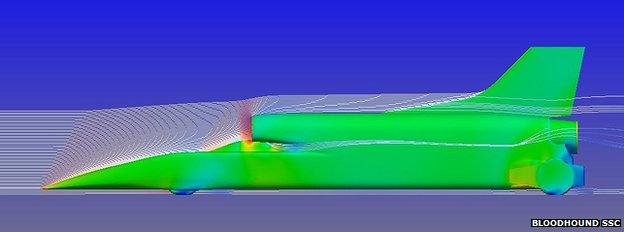
Keeping it on the ground – the final answer
Ron Ayers, our aerodynamic genius, looked at all the recent research data and gave his verdict, which he says "at my age is based as much on instinct as on research".
I'm not worried about Ron using his instincts - he has this astonishing ability to get it right (I'm convinced that he uses the "dark side of the force" as much as aerodynamic theory).
The final answer is that the underside of the car will be flat, and the nose will be in line with the bottom of the body, to give us the optimum lift-neutral shape.
Looking ahead to the New Year, we are just about to start our full-size rocket test programme in the UK. We've found the ideal venue (more details shortly) and the pump rig, complete with Cosworth F1 engine to drive the rocket pump, is now ready to go. That's going to start 2012 with a bang!
.jpg)
Mr Vettel, I hear you drive a pump motor?
I was at the Autosport Awards this month to present Sebastian Vettel with the main prize of the evening, which he thoroughly deserved. While I was there, I couldn't resist reminding the audience that the 135,000 horsepower Bloodhound SSC uses an F1 engine as a pump motor.
Mr Vettel, I hear you drive a pump motor?
Everyone at the Autosport event wanted to know how Bloodhound was getting on, and was delighted to hear that we have had such a good year in 2011.
All the primary structure is being delivered thanks to Hampson and ACG, we've effectively finished the main aerodynamic design, we've signed Rolex as our timing partner - it's been amazing.
Bloodhound's Engineering Adventure will continue flat out next month but, in the meantime, you may enjoy watching the latest festive offering from Cisco BHTV.
Thanks for all your support and I hope you have a terrific Christmas and a supersonic New Year.
Happy Christmas, external from all of the Bloodhound Team!
- Published11 November 2011
- Published10 September 2011
- Published18 May 2011
- Published26 April 2011
- Published5 March 2011
- Published7 February 2011
- Published21 November 2010
- Published13 November 2010